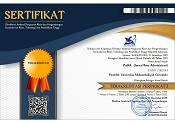Public Service Bureaucratic Reform: A Case Study on Coordination in One Stop Services (KPTSP) in Takalar Regency
Abstract
Bureaucratic services tend not to improve their performance and carry out reforms. Service users are often faced with so many problems when they are dealing with bureaucracy. The purpose of this study is to describe the reform of the Public Service Bureaucracy in terms of coordination in One Stop Services (KPTSP) in Takalar Regency. In this study, a qualitative approach was used. The type of research used in this research is descriptive research type. The results showed that hierarchical mechanisms in the form of a structured flow of coordination and power need each other to establish cooperation within organizational units. The market mechanism shows that the change in the bureaucracy from services to revenue to provide income for the region through the collection of fees. Licensing and providing incentives can improve the performance of One-Stop Services, Takalar District has a network mechanism that is interrelated and needs each other, this can be seen from the requirements given by the Service Agency One-Stop Integrated Takalar Regency that asks for recommendations from related Regional Work Units (SKPD).
Keywords
Full Text:
PDFReferences
Brusoni, S. (2005). The limits to specialization: problem solving and coordination in ‘modular networks’. Organization Studies, 26(12), 1885-1907.
Delfitri, Y. (2005). Reformasi Birokrasi di Mahkamah Agung. Jakarta: Universitas Krisnadwipayana.
Dessler, G. (2000). Human Resource Management Prentice-Hall Inc. New Jersey USA, 370-372.
Glasbergen, P., Biermann, F., & Mol, A. P. (Eds.). (2007). Partnerships, governance and sustainable development: Reflections on theory and practice. Edward Elgar Publishing.
Gudina, M. (2007). Ethnicity, democratisation and decentralization in Ethiopia: The case of Oromia. Eastern Africa Social Science Research Review, 23(1), 81-106.
Haris, S. (2005). Desentralisasi dan otonomi daerah: desentralisasi, demokratisasi & akuntabilitas pemerintahan daerah. Yayasan Obor Indonesia.
Insani, N. (2020). Apparatus Professionalism and Public Service Ethics. Journal La Sociale, 1(1), 25-28.
Islam, M. R., & Farazmand, A. (2008). Perceptions of civil servants toward privatization and development: A new exploratory study. Public Organization Review, 8(1), 37-52.
Junaedi, J. (2020). Implementation of Good Corporate Governance (GCG) in the Field of Securing Plantation Assets. Journal La Sociale, 1(3), 5-9.
Moll, J., & Hoque, Z. (2000). Rationality, new public management and changes in management control systems: a case study of managing change in an Australian local government setting. In Interdisciplinary Perspectives on Accounting (IPA) 2000 Conference, Manchester.
Ongaro, E. (2009). Public management reform and modernization: Trajectories of administrative change in Italy, France, Greece, Portugal and Spain. Edward Elgar Publishing.
Robbins, S. P. (2006). Perilaku Organisasi. Jakarta: PT Indeks Kelompok Gramedia.
Waddock, S. A. (1988). Building successful social partnerships. MIT Sloan Management Review, 29(4), 17.
Yakub, A., Ghani, A. B. A., & Anwar, M. S. I. (2018). Urgency of Political Decentralization and Regional Autonomy in Indonesia: Local Perspectives. Journal of International Studies, 14, 141-150.
Article metrics
Refbacks
- There are currently no refbacks.
Copyright (c) 2020 Publik (Jurnal Ilmu Administrasi)

This work is licensed under a Creative Commons Attribution-ShareAlike 4.0 International License.

Publik (Jurnal Ilmu Administrasi) is licensed under a Creative Commons Attribution-ShareAlike 4.0 International License.










